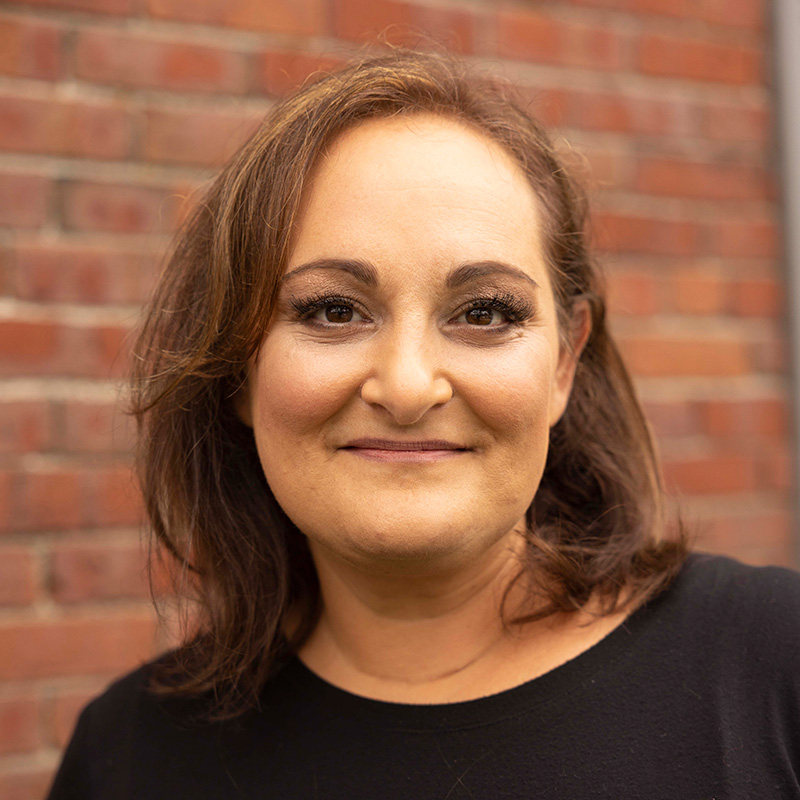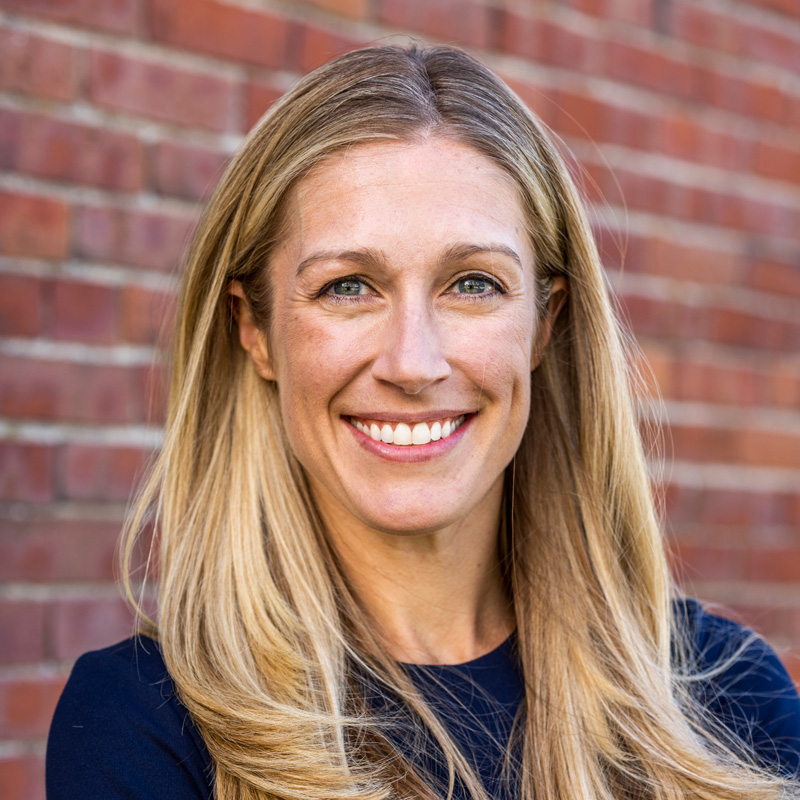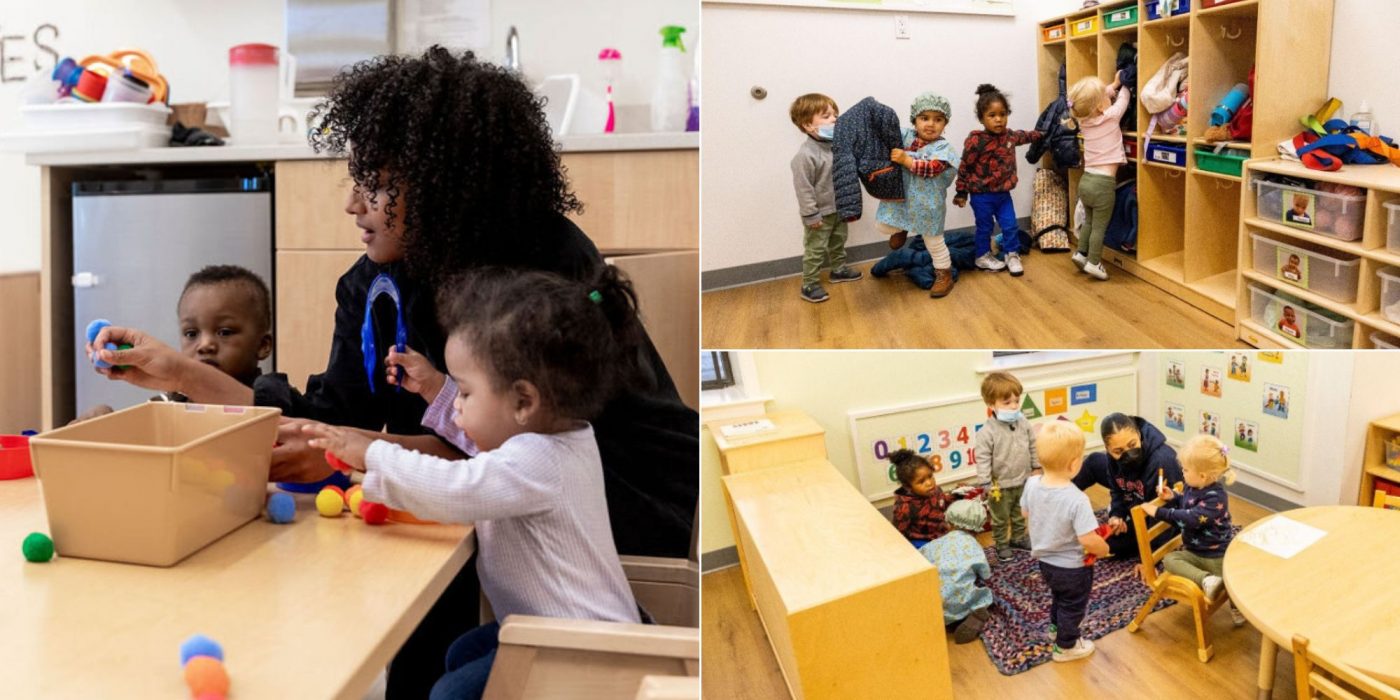The child care landscape throughout the U.S. can put just about anyone in a grim frame of mind. The problems are legion and the solutions few or unheeded, even as voices in high places can’t say enough about the worth of our children and of the sanctity of our families.
Bostonians Sarah Siegel Muncey and Lauren Birchfield Kennedy recognize this landscape from multiple vantage points: as mothers who scrambled to find good care for their children, as professional women working in education and health care policy, and as citizens committed to a society that works. But rather than surrender, they have used their frustration to stoke the blaze in their bellies for systemic change. The result is Neighborhood Villages, a powerful Boston-based nonprofit designed to bring about systems change in early care and education—scaling their successes first in Boston, next throughout Massachusetts, and if they have anything to say about it (they demonstrably do), coming soon to an America near you.
Muncey and Kennedy got to know each other when they were pregnant. Their babies were born within a few days of each other, and soon they were experiencing firsthand the treadmill of concern any parent in the U.S. now experiences to some degree: How do I find child care? How do I work without child care? How do I continue my career in any meaningful way and have children? Why are we even having this conversation in the wealthiest country on the planet?
Joining the millions of their peers in the U.S. who ask those questions and are desperate for change, Muncey and Kennedy had the resources and background and, as they will admit, the privilege to take the issue on in a big way. Muncey, Neighborhood Villages’ co-president and chief innovation officer, has a master’s degree from the Harvard Graduate School of Education and spent 12 years at Boston Collegiate Charter School, first as a 7th grade English teacher and ultimately as Director of Family and Community Relations. Kennedy, the nonprofit’s co-president and chief strategy officer, holds a law degree from Harvard, served as Director of Health Policy at the National Partnership for Women & Families in Washington, DC, and oversaw advocacy strategy for key policy initiatives including implementation of the Affordable Care Act. Together, they had the chops and the will to tackle the ganglia of issues surrounding child care in a strategic, targeted way.
They knew that child care is foundational to our economy, our communities and our country. They knew that the U.S., unlike every other developed nation, makes no meaningful public investment in child care. Readers of Early Learning Nation are no strangers to this story.
No One Is Coming to Save Us
In looking at the situation, Muncey and Kennedy realized the first of what Muncey calls their three “fundamental guiding principles.”

“Somebody’s got to figure this out, and no one is coming to save us.” she says. “There’s lots of talking and meeting and declaring that it’s a problem, but we want to do it—actually do it. We can’t put any more chewing gum in this dam.”
The brokenness of the system also offers freedom and possibility, which is the space Muncey says Neighborhood Villages is claiming.
“If you look at K-12, there are so many things that will never change because they’ve been done that way so long. It’s just accepted as the way things are. But because child care infrastructure is so hollowed out and missing, we can start from that nothing and create from there.
“This devaluation and lack of professional value given to child care is a very direct line to the racism and misogyny on which we’ve built our country,” she says. “It’s time for an entirely new system that’s not built on that racist, patriarchal foundation. We can start from elegant. We can start from operationally efficient. We can start from anti-racist. It’s an amazing, exciting opportunity. At Neighborhood Villages, we feel like we have the greatest job in the world—to actually fix things.”
How the nonprofit goes about fixing things is to work with five early-learning partners in Boston to pilot and test programs. This is “the Neighborhood,” comprising 13 child care sites around Boston that serve a highly diverse population. All Neighborhood Villages (NV) programs are designed to scale statewide to demonstrate the infrastructure needed to create a workable, high-quality early education and care system. Funded by philanthropy, government grants and public investment, the Neighborhood is both an innovation lab and proof of concept for scalable solutions.
“We show that it can be done because we’ve done it,” Muncey says. “For example, when folks started back to work during the pandemic, it only took a few weeks to realize that we were going to have to figure out Covid testing because every time a teacher coughed, she was out for eight days trying to isolate and find a test. We found a philanthropic partner to pay for tests, worked with the people who had set up the nursing home testing in the state of Massachusetts who knew what they were doing, worked with health economists from Berkeley and MIT and created a really, really good program.
“Then we sat in my living room with cardboard boxes going, ‘I guess everyone needs this many swabs …’ We made the tests happen—in a scientifically sound way—and then we said, ‘This is ready for the state.’ When we went to the state, they said, ‘You can’t do testing in child care. It’s not possible because the sector is 7,500 small businesses.’
“We took them data from our evaluators at Boston Children’s Brazelton Institute and said, ‘Actually, we’ve been testing 700 teachers…’ We were able to show that it was suppressive testing, was keeping people safe and within about two weeks we were getting to the point where no one was getting sick.” Massachusetts deployed the program for ECE statewide.
A similar scalable innovation was Neighborhood Villages’ development of professional pathways for the ECE workforce. The nonprofit found that, though free certification classes were offered through community colleges, that model didn’t work well for early educators who were required to attend a 7 pm class on Tuesday in a completely different neighborhood after spending all day working with children and possibly needing to get home to their own. So, NV brought the course to the teachers and the essential certification, Child Growth, was taught at five sites around the city every Saturday, with each site offering three or four classes—in Haitian, Creole, Spanish, Mandarin, English and Portuguese. The program is now available to all child care providers in the state of Massachusetts.
“Once these things are piloted,” she says, “you realize the second it starts, ‘Well, that was doable. So, moving on …’”
It’s Not Rocket Science
There’s a certain “Hold my beer” quality to NV’s approach. Someone says it can’t be done; NV starts asking providers what they need and builds those missing pieces of infrastructure. It’s like building with Legos, Muncey says. The goal is a child care system that functions beautifully at the state, regional, school and family level.
“We’re building all these pieces with a great sense of urgency,” she says. “Deliberate urgency. No one is coming to save us; and we have to do it. Our second guiding principle is: It isn’t rocket science. All of this is doable. Even stuff that’s hard—like rocket science—is totally doable. We do it every day. We can do hard things.
“Big government programs are complicated and take thoughtful work and iteration,” Muncey says. “The Affordable Care Act is complicated and hard, and yet, we do it. The U.S. military child care system did it. Legislation (creating military child care) was passed in 1989 and over the next 10 years, the military set standards and provided incentives and … all of a sudden, you have a system. It’s not perfect, but the system is in place. We know how to do this.”
We’re Not Magicians
All of this leads to NV’s third and final fundamental guiding principle. The most basic reality of a functional child care system is the fact that educators must be paid real money. They’re not magicians. They can’t pull education, labor and love out of thin air and pay mortgages and groceries with pixie dust.
“If we don’t start paying teachers professional wages by funding ECE as a public good, none of the stuff we’ve been talking about matters at all,” Muncey says. “If we’re going to keep paying people nothing, they’re going to leave. If we keep training teachers and they can’t pay their bills, they’re going to leave.
“The most important thing for people to understand is that this is so doable, but we are not magicians. A functioning child care system takes money and will.”
Building the Will
The pandemic revealed the brokenness in America’s child care system like nothing before. Every issue associated with it was held up in stark relief, like shining a floodlight on that intransigent mess in the back closet. People who thought they had no stake in solving the problem suddenly found themselves invested. And, as we’ve seen over and over in the U.S., when enough people are invested in a problem and put their energy, insistence and money into it, elected officials start looking at solutions.

“They will have to,” Muncey says. “We’ve learned from so many other movements what it takes. Moms Demand Action for Gun Sense in America—often called Moms Demand Action—wore their red tee shirts and physically attended every state house when a piece of gun legislation was being talked about. We’ve seen what angry moms can do in this country many times.
“When Lauren Kennedy and I made the podcast (No One is Coming to Save Us—give it a listen!), we knew we needed to give people a vocabulary around the issue. People don’t know how to talk about it. Let’s say you have feelings about guns or abortion. Regardless of what side you’re on about it, if someone looked at you and said, ‘Tell me what you think about guns…’ you’d have a little speech prepared with all the things you’re demanding from government about that.
“Child care isn’t like that. People don’t know what to ask for or how because we’ve been told to deal with it privately. ‘You went and got yourself pregnant, figure it out.’ We don’t have the words to say, ‘I don’t think I should have to pay more than 7 percent of my income for child care. How about that, Legislator?’”
In a very brief time, the podcast grew from a venture the two creators thought might be a “wonky, niche thing” to being the # 13 podcast in the U.S. (beating out Prince Harry on Armchair Expert, Muncey’s proud to say). Plainly, child care is a conversation whose time has come.
To harness that energy, NV’s affiliated 501(C)4 organization, Neighborhood Villages Action Fund, works to make sure policymakers hear the voices demanding change—and the demand to deliver that change now, not a few more years down the road.
“We have to let them know we expect them to fix this immediately,” Muncey says. “I’m 42 and my mom had pretty much the same level of support that’s available to us now.
“Change is coming. Everyone wants this and it’s coming, one way or the other. Our job is to know how to do it well when it does.”
And that, as Neighborhood Villages has shown, is doable: Determine specifically what’s needed; build that solution; test it; when it works, fund it and scale it. It’s not rocket science.
RESOURCES
PODCAST: No One is Coming to Save Us. Neighborhood Villages partnered with Lemonada Media to present No One is Coming to Save Us, a podcast that takes a deep dive into the child care crisis. Host Gloria Riviera of ABC and special correspondent Kristen Bell explore how the current child care system is failing everyone in it—children, families, providers and educators—and spotlight solutions for building a child care system that works.
I’m a Child Care Voter. Neighborhood Villages Action Fund is a 501c4 organization, a separate legal entity from the nonprofit Neighborhood Villages. This designation allows the Neighborhood Villages Action Fund to lobby, organize and advocate for policy change at the state and federal level for equitable, accessible and high-quality early education and care system. One of its major initiatives is the “I’m a Child Care Voter” campaign that’s creating a movement and a presence to be reckoned with, unmistakably articulating the message to political leaders that more than a few individual mothers have a very big stake in this fight and are demanding much, much more than comforting words.

K.C. Compton
K.C. Compton worked as a reporter, editor and columnist for newspapers throughout the Rocky Mountain region for 20 years before moving to the Kansas City area as an editor for Mother Earth News. She has been in Seattle since 2016, enjoying life as a freelance and contract writer and editor.



